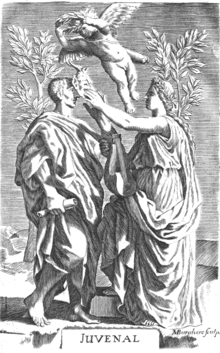
Back Juvenalis Afrikaans Juvenal AN جوفينال Arabic جوفينال (شاعر من روما القديمه) ARZ Décimu Xunu Xuvenal AST جوونال AZB Ювенал Byelorussian Ювенал Bulgarian Juvenal Breton Juvenal Catalan
This article includes a list of general references, but it lacks sufficient corresponding inline citations. (February 2011) |
Juvenal | |
|---|---|
 | |
| Born | c. 55 AD Aquinum, Italy, Roman Empire |
| Died | 128 (aged c. 73) |
| Occupation | Poet |
| Nationality | Roman |
| Genre | Satire |
Decimus Junius Juvenalis (Latin: [ˈdɛkɪmʊs ˈjuːniʊs jʊwɛˈnaːlɪs]), known in English as Juvenal (/ˈdʒuːvənəl/ JOO-vən-əl; c. 55–128), was a Roman poet. He is the author of the collection of satirical poems known as the Satires. The details of Juvenal's life are unclear, although references within his text to known persons of the late first and early second centuries AD fix his earliest date of composition. One recent scholar argues that his first book was published in 100 or 101.[1] A reference to a political figure dates his fifth and final surviving book to sometime after 127.[2]
Juvenal wrote at least 16 poems in the verse form dactylic hexameter. These poems cover a range of Roman topics. This follows Lucilius—the originator of the Roman satire genre, and it fits within a poetic tradition that also includes Horace and Persius. The Satires are a vital source for the study of ancient Rome from a number of perspectives, although their comic mode of expression makes it problematic to accept the content as strictly factual. At first glance the Satires could be read as a critique of Rome. That critique may have ensured their preservation by the Christian monastic scriptoria, although the majority of ancient texts did not survive.[citation needed]
- ^ Uden, J. The Invisible Satirist: Juvenal and Second-Century Rome (Oxford, 2015), pp. 219–226
- ^ Mayor, John Eyton Bickersteth (1881). Thirteen Satires of Juvenal. Cambridge: Macmillan and Company. p. xviii.